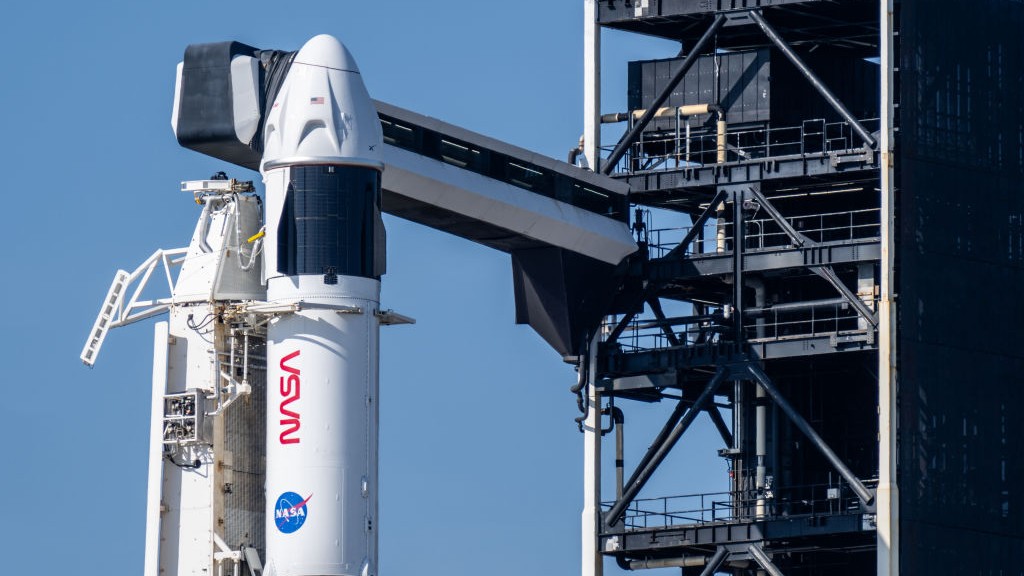Elon Musk threatens to decommission SpaceX's Dragon spacecraft after Trump feud. What does it mean for the US space industry?
A war of words between SpaceX CEO Elon Musk and President Donald Trump could lead to significant fallout for U.S.-led space exploration.

An explosive, and very public, feud between President Donald Trump and SpaceX founder Elon Musk on Thursday (June 5) has raised doubts over the future of America's space industry.
The war of words could place $22 billion of SpaceX’s government contracts with multiple U.S. space programs at risk, according to one estimate, although the real figure — which remains classified — could be significantly higher.
Following threats from the president on his social media platform Truth Social that the U.S. could cancel the government contracts and subsidies awarded to Musk's companies, the CEO of SpaceX retorted that his space company would "begin decommissioning its Dragon spacecraft immediately."
In light of the President’s statement about cancellation of my government contracts, @SpaceX will begin decommissioning its Dragon spacecraft immediately pic.twitter.com/NG9sijjkgWJune 5, 2025
Hours later, Musk responded to a follower telling him to "cool off" by saying "Good advice. Ok, we won't decommission Dragon."
Good advice. Ok, we won’t decommission Dragon.June 6, 2025
The disagreement began on Tuesday (June 3) when Musk criticized the administration's proposed tax and spending bill on his social media platform X.
"This massive, outrageous, pork-filled Congressional spending bill is a disgusting abomination. Shame on those who voted for it: you know you did wrong. You know it," Musk wrote on X.
Get the world’s most fascinating discoveries delivered straight to your inbox.
This then escalated into a full-blown social media feud on Thursday, with Musk claiming that Trump's name appears in unreleased files relating to sex offender Jeffrey Epstein.
The White House condemned these allegations. "This is an unfortunate episode from Elon, who is unhappy with the One Big Beautiful Bill because it does not include the policies he wanted," representatives wrote on X.
Trump then claimed Musk "just went CRAZY," posting: "The easiest way to save money in our Budget, Billions and Billions of Dollars, is to terminate Elon's Governmental Subsidies and Contracts. I was always surprised that Biden didn't do it!"
What is SpaceX's Dragon spacecraft, and why would decommissioning it be a problem?
SpaceX's Dragon capsule is a reusable spacecraft capable of carrying up to seven passengers and cargo to and from Earth orbit, according to SpaceX. NASA currently relies on the capsule to ferry astronauts to the International Space Station (ISS), so canceling these government contracts effectively eliminates America's ability to launch astronauts to space from American soil, Live Science's sister website, Space.com, reported.
NASA also heavily relies on SpaceX for other space programs, having selected the Starship Human Landing System (HLS), a lunar lander variant of the company's next-generation Starship spacecraft, to carry American astronauts to the moon for the first time in more than 50 years aboard the 2027 Artemis 3 mission.
NASA is investing $4 billion into Starship's development, and canceling its contract could seriously handicap NASA and the future of U.S.-led space exploration.
While other competitors exist, such as Amazon founder Jeff Bezos's Blue Origin and Boeing's Starliner spacecraft, they lag far behind SpaceX.
The Starliner capsule is not yet certified to fly operational astronaut missions and was responsible for "stranding" two astronauts on the ISS for nine months last year. The astronauts returned to Earth on March 18 aboard a SpaceX Dragon capsule, and neither Boeing nor NASA have offered any significant updates into fixes that will make Starliner flightworthy.
SpaceX's lead on its competitors is reflected in the size of its government subsidies. In April, the U.S. Space Force, the military branch of U.S. space exploration, awarded the company nearly $6 billion in launch contracts, while the United Launch Alliance received $5.4 billion and Blue Origin $2.4 billion.
In response to the feud between Musk and Trump, NASA press secretary Bethany Stevens declined to comment on SpaceX, but she did tell Reuters that "we will continue to work with our industry partners to ensure the president's objectives in space are met."
NASA's deputy administrator Lori Garver told Reuters that, as well as not being in national interests, canceling SpaceX's contacts would probably not be legal. However, she also added that "a rogue CEO threatening to decommission spacecraft, putting astronauts' lives at risk, is untenable."

Pandora is the trending news editor at Live Science. She is also a science presenter and previously worked as Senior Science and Health Reporter at Newsweek. Pandora holds a Biological Sciences degree from the University of Oxford, where she specialised in biochemistry and molecular biology.
- Ben TurnerActing Trending News Editor
You must confirm your public display name before commenting
Please logout and then login again, you will then be prompted to enter your display name.
 Live Science Plus
Live Science Plus





